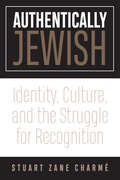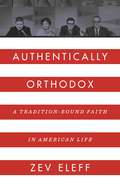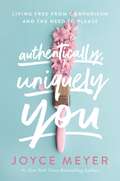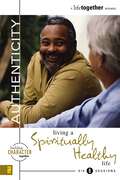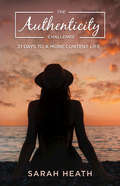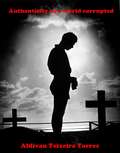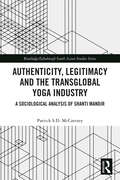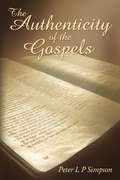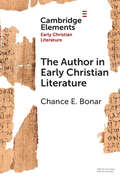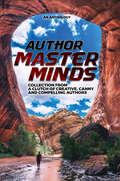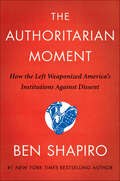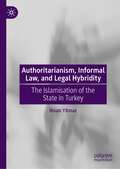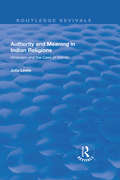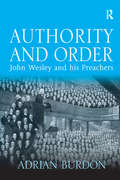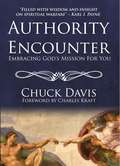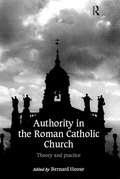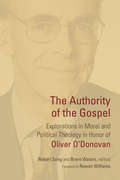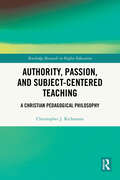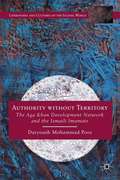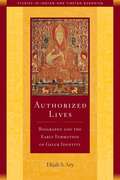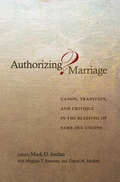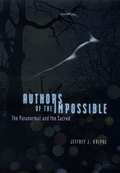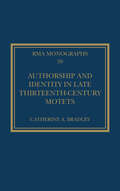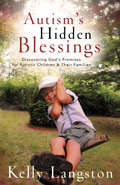- Table View
- List View
Authentically Jewish: Identity, Culture, and the Struggle for Recognition
by Stuart Z. CharméThis book analyzes the different conceptions of authenticity that are behind conflicts over who and what should be recognized as authentically Jewish. Although the concept of authenticity has been around for several centuries, it became a central focus for Jews since existentialist Jean-Paul Sartre raised the question in the 1940s. Building on the work of Sartre, later Jewish thinkers, philosophers, anthropologists, and cultural theorists, the book offers a model of Jewish authenticity that seeks to balance history and tradition, creative freedom and innovation, and the importance of recognition among different groups within an increasingly multicultural Jewish community. Author Stuart Z. Charmé explores how debates over authenticity and struggles for recognition are a key to understanding a wide range of controversies between Orthodox and liberal Jews, Zionist and diaspora Jews, white Jews and Jews of color, as well as the status of intermarried and messianic Jews, and the impact of Jewish genetics. In addition, it discusses how and when various cultural practices and traditions such as klezmer music, Israeli folk dance, Jewish yoga and meditation, and others are recognized as authentically Jewish, or not.
Authentically Orthodox: A Tradition-Bound Faith in American Life
by Zev EleffWith a fresh perspective, Authentically Orthodox: A Tradition-Bound Faith in American Life challenges the current historical paradigm in the study of Orthodox Judaism and other tradition-bound faith communities in the United States.Paying attention to "lived religion," the book moves beyond sermons and synagogues and examines the webs of experiences mediated by any number of American cultural forces. With exceptional writing, Zev Eleff lucidly explores Orthodox Judaism’s engagement with Jewish law, youth culture and gender, and how this religious group has been affected by its indigenous environs. To do this, the book makes ample use of archives and other previously unpublished primary sources. Eleff explores the curious history of Passover peanut oil and the folkways and foodways that battled in this culinary arena to both justify and rebuff the validity of this healthier substitute for other fatty ingredients. He looks at the Yeshiva University quiz team’s fifteen minutes of fame on the nationally televised College Bowl program and the unprecedented pride of young people and youth culture in the burgeoning Modern Orthodox movement. Another chapter focuses on the advent of women’s prayer groups as an alternative to other synagogue experiences in Orthodox life and the vociferous opposition it received on the grounds that it was motivated by "heretical" religious and social movements. Whereas past monographs and articles argue that these communities have moved right toward a conservative brand of faith, Eleff posits that Orthodox Judaism—like other like-minded religious enclaves—ought to be studied in their American religious contexts. The microhistories examined in Authentically Orthodox are some of the most exciting and understudied moments in American Jewish life and will hold the interest of scholars and students of American Jewish history and religion.
Authentically, Uniquely You: Living Free from Comparison and the Need to Please
by Joyce MeyerDiscover your unique gifts and dare to be different with #1 New York Times bestselling author and renowned Bible teacher, Joyce Meyer.God has given you gifts so you can fulfill His purpose for your life, but if you're like a lot of people, you may not have recognized your talents yet. Start asking God to show you something special about the way He's made you.To some people, He's given a very tender, compassionate heart, and some He has wired to lead others effectively. Others, He has given a gift of being able to communicate clearly, to teach, to make scientific discoveries, or to write beautiful music. Only you can discover all the dynamic gifts He's placed in you.Become Authentically, Uniquely You because God is never going to help you be anyone but yourself. He loves you just as you are. Let God use you, with all your strengths and weaknesses, and transform you from the inside out to do something powerful beyond your wildest dreams.
Authentically, Uniquely You: Living Free from Comparison and the Need to Please
by Joyce MeyerDiscover your unique gifts and dare to be different with #1 New York Times bestselling author and renowned Bible teacher, Joyce Meyer.God has given you gifts so you can fulfill His purpose for your life, but if you're like a lot of people, you may not have recognized your talents yet. Start asking God to show you something special about the way He's made you.To some people, He's given a very tender, compassionate heart, and some He has wired to lead others effectively. Others, He has given a gift of being able to communicate clearly, to teach, to make scientific discoveries, or to write beautiful music. Only you can discover all the dynamic gifts He's placed in you.Become Authentically, Uniquely You because God is never going to help you be anyone but yourself. He loves you just as you are. Let God use you, with all your strengths and weaknesses, and transform you from the inside out to do something powerful beyond your wildest dreams.
Authenticity: Living a Spiritually Healthy Life (Building Character Together)
by Todd Wendorff Brett Eastman Dee Eastman Denise WendorffWhat does it take to build character? How do you instill godly qualities inside yourself that are displayed consistently through words, actions, and attitudes that reflect what Jesus himself is like? Building Character Together takes you and your small group inside the Bible to learn character-building lessons from some of its most compelling figures. In six enjoyable, interactive sessions, each volume in this six-volume series helps you deeply explore the complex issues of developing Christian character. Combining study, discussion, and shared experiences, here is a pathway to growth both individually and as a group. Explore the lives of David, Mary Magdalene, Jacob, and other men and women of the Bible. Learn lessons from their successes and failures and from their relationships with God and other people that you can readily link to yourself and your own life circumstances. Enjoy frank discussions that draw you and other group members deeper into each others’ lives. And put it all into action in a one-day group retreat, a service project, a mini-mission work, and other experiences that help you make the leap from good words to good works.
The Authenticity Challenge: 21 Days to a More Content Life (The Authenticity Challenge)
by Sarah HeathFOMO, the fear of missing out, isn’t new. But today, social media makes us increasingly more aware of the fun, interesting, and enjoyable activities that others are experiencing. We yearn for the lives we assume others are already living. Through insights gained through her own journey toward contentment, author Sarah Heath found the answer to overcoming these feelings is to live an authentic life. Rather than longing for and chasing after somebody else’s life, you have to show up completely to your own life with honesty and courage. In The Authenticity Challenge, Sarah invites you to embrace authenticity in three key areas of your life: vocation (the What), relationships (the Who), and faith (the Why). Over the course of 21, days you will be guided through seven daily challenges each week related to one of these areas. Take the challenges on your own or combine with the DVD featuring Sarah in 8-10 minute video segments designed for small group discussion. Additionally, leader helps found in the book make sharing group study easier, allowing you to share your experience with others and encourage one another as you grow in authenticity. Being authentic in all areas of your life allows you to see how uniquely beautiful your story is. It enables you to be grateful for who you are. And it empowers you to move toward a more content life.
Authenticity in a world corrupted
by Aldivan Teixeira TorresThe tale shows the values needed to live well the life and to change your reality. Through insightful advice, points a way to reach the o success and the happiness. Do not miss this opportunity from change.
Authenticity, Legitimacy and the Transglobal Yoga Industry: A Sociological Analysis of Shanti Mandir (Routledge/Edinburgh South Asian Studies Series)
by Patrick S.D. McCartneyThis book is a sociological study of knowledge and knowers and explores the production and perceived value of ‘yogic knowledge,’ how distinction is curated, and how access to this knowledge is gained.The book focuses on the organization Shanti Mandir (SM) in India, a new religious movement, which was founded in 1987 by Swami Nityananda Saraswati. It is a non-profit charity operating within the unregulated and competitive multi-billion dollar global and domestic wellness/spiritual tourism industries, and as a registered education provider within India’s education industry. The main aim of this book is to answer the question how legitimacy is acquired, negotiated and expressed within the SM yoga ashram. The theoretical framework applied in this study is a confluence of the sociology of education, knowledge and religion. The author engages a methodology based primarily on ethnographic participant-observation and discourse analysis. Situating SM within the transglobal yoga and spiritual tourism industries, the book demonstrates how SM promotes itself as a provider of a consumable lifestyle that spiritual aspirants can adopt through attending retreats, workshops, meditation intensives, yoga teacher training and philosophy courses in their global network of ashrams. By identifying the structuring forces of the guru’s discourse, and focusing on the marketing strategies and subsequent exchanges of capital and affective emotions, this monograph documents what the legitimate yogic identity promoted by SM is within the context of the transglobal yoga industry.A highly original and incisive portrait of an Indian devotional community with strong transnational connections, this book will be of interest to researchers studying South Asian Studies, Religious Studies, Indian religion and yoga.
The Authenticity of the Gospels
by Peter L SimpsonThat the Gospels are the writings of their traditional Apostolic authors was long held to be settled truth. It was also long held that Matthew was first and as early as the 40sAD, followed by Mark and Luke, and lastly by John, and that all were written before about 70AD. These views have been doubted or denied by New Testament scholars from about the end of the 18thCentury. The dominant view is that the Gospels were not written by eyewitnesses, though they depend on material that may go back to eyewitnesses. Mark is said to have been written first and not much before 70AD. Matthew and Luke are later and depend on Mark and some unknown sources. John is last, follows an independent tradition, and could be as late as 100AD.The reason for this change of views is the so-called historical critical method, which claims to be scientific and up to date in literary criticism and the detection of different temporal layers in written texts. The method also assumes that reports of miracles and other supernatural phenomena are not historical but later inventions added for religious purposes.This book shows that the historical critical method is not historical or critical or even a method. For the method assumes but cannot prove that supernatural happenings are unhistorical; it ignores the historical evidence about the origin and authorship of the Gospels; its literary criticism is unimaginative and its application of it to questions of dating arbitrary. There is no reason to accept its results as well founded or even believable. The traditional dating and authorship of the Gospels is the only account that makes sense.Nevertheless, elements of the historical critical method have a legitimate use if they are applied fairly and taken along with the historical evidence and the fact (well established by eyewitnesses) of supernatural realities. When these elements are so used they can be shown to give plausible and defensible accounts of the origin, in particular, of the Gospels of Mark and Luke, which, along with Matthew, show signs of dependence and overlap. If the historical evidence is taken seriously, and if literary criticism is applied fairly, a plausible account can be given of the origin in particular of the Gospel of Mark, of how it arose from the preaching of Peter relative to the older Gospel of Matthew and to the newer Gospel of Luke sponsored by the Apostle Paul.This alternative account of the origins of Mark and Luke is a fine example of how historical evidence and literary criticism can be used to explain otherwise puzzling phenomena. This account is perhaps not the only one to save all the phenomena. But it shows how the traditional authorship and dating of the Gospels, contrary to the historical critical method, make excellent sense of all the phenomena: literary, historical, and rational. The traditional view about the Gospels is the only sensible view to adopt.
The Author in Early Christian Literature (Elements in Early Christian Literature)
by Chance E. BonarWhile scholars of ancient Mediterranean literature have focused their efforts heavily on explaining why authors would write pseudonymously or anonymously, less time has been spent exploring why an author would write orthonymously (that is, under their own name). This Element explores how early Christian writers began to care deeply about 'correct' attribution of both Christian and non-Christian literature for their own apologetic purposes, as well as how scholars have overlooked the function that orthonymity plays in some early Christian texts. Orthonymity was not only a decision made by a writer regarding how to attribute one's own writings, but also how to classify other writers' texts based on proper or improper attribution. This Element urges us to examine forms of authorship that are often treated as an unexamined default, as well as to more robustly consider when, how, for whom, and for what purposes an instance of authorial attribution is deemed 'correct.
Author Masterminds: Collection from a Clutch of Creative, Canny, and Compelling Authors
by Author MastermindsAuthor Masterminds, a refreshing eclectic collection of the musings and insights of a group of superb published authors, gives the reader a kaleidoscopic look into the thinking of very bright, insightful, and sometimes whacky writers. Within these covers you'll find deeply perplexing ideas, creative and zany inspirations, arguments, and different ways of viewing the world from what you might think apparent. Author Masterminds' authors think, react, and create; catch a glimpse of what goes on in their dynamic minds. Author Masterminds is a potpourri of everything from Christian horror to impossible crime; forensics to murder mystery; and sled dogs to political thrillers. From The Tale of Grady Dellaneaux to A Feather in Your Heart there is something for every reader's taste. And then there's: Dad Was A Democrat, Do You Think I'm Crazy?, It's Best To Park Your Car Above The High Tide Mark, Mrs. Zucherberg, The Matter of Timber Trickery, The Time Travel App, and much more.
The Authoritarian Moment: How the Left Weaponized America's Institutions Against Dissent
by Ben ShapiroNew York Times BestsellerHow far are Americans willing to go to force each other to fall in line?According to the establishment media, the intelligentsia, and our political chattering class, the greatest threat to American freedom lies in right-wing authoritarianism. We’ve heard that some 75 million Americans who voted for Donald Trump represent the rise of American fascism; that conservatives have allowed authoritarianism to bloom in their midst, creating a grave danger for the republic.But what if the true authoritarian threat to America doesn’t come from the political right, but from the supposedly anti-fascist left?There are certainly totalitarians on the political right. But statistically, they represent a fringe movement with little institutional clout. The authoritarian left, meanwhile, is ascendant in nearly every area of American life. A small number of leftists—college-educated, coastal, and uncompromising—have not just taken over the Democratic Party but our corporations, our universities, our scientific establishment, our cultural institutions. And they have used their newfound power to silence their opposition.The authoritarian Left is aggressively insistent that everyone must conform to its values, demanding submission and conformity. The dogmatic Left is obsessed with putting people in categories and changing human nature. Everyone who opposes it must be destroyed.Ben Shapiro looks at everything from pop culture to the Frankfurt school, social media to the Founding Fathers, to explain the origins of our turn to tyranny, and why so many seem blind to it.More than a catalog of bad actors and intemperate acts,The Authoritarian Moment lays bare the intolerance and rigidity creeping into all American ideology – and prescribes the solution to ending the authoritarianism that threatens our future.
Authoritarianism, Informal Law, and Legal Hybridity: The Islamisation of the State in Turkey
by Ihsan YilmazThis book investigates Turkey’s departure from a ‘flawed democracy’ under Kemalist secularism, and its transitioning into Islamist authoritarian Erdoğanism, through the lenses of informal law, legal pluralism, and legal hybridity. In doing so, it examines the attempts of Turkey’s ruling party (AKP) at social engineering and gradual Islamisation of the Turkish state and society, by using informal Islamist laws. To that end, the book argues that the AKP has paved the way for Islamist legal hybridity where society, state, and law, are being gradually Islamised on an ad hoc basis. Informal law and legal pluralism in Turkey have had a non-state characteristic which have permitted Muslims to solve disputes by seeking the opinions of religio-legal scholars. Yet under the AKP rule, this informal legal system has become increasingly dominated by conservatives, sometimes radical Islamists, which the governing party has taken advantage of by either formalizing some parts of the informal Islamist law, or using it informally to mobilize its supporters against the opposition.
Authority and Meaning in Indian Religions: Hinduism and the Case of Valmiki (Routledge Revivals Ser.)
by Julia LeslieThis title was first published in 2003. Can a text be used either to validate or to invalidate contemporary understandings? Texts may be deemed 'sacred', but sacred to whom? Do conflicting understandings matter? Is it appropriate to try to offer a resolution? For Hindus and non-Hindus, in India and beyond, Valmiki is the poet-saint who composed the epic Rà mà yaõa. Yet for a vocal community of dalits (once called 'untouchables'), within and outside India, Valmiki is God. How then does one explain the popular story that he started out as an ignorant and violent bandit, attacking and killing travellers for material gain? And what happens when these two accounts, Valmiki as God and Valmiki as villain, are held simultaneously by two different religious groups, both contemporary, and both vocal? This situation came to a head with controversial demonstrations by the Valmiki community in Britain in 2000, giving rise to some searching questions which Julia Leslie now seeks to address.
Authority and Order: John Wesley and his Preachers
by Adrian BurdonThe important questions in ecumenical dialogue centre upon issues of authority and order. This book uses the development of ministry in the early Methodist Church to explore the origins of the Methodist Order and identify the nature of authority exercised by John Wesley, the founder of the Methodist Church. Showing Methodism as having been founded upon Episcopalian principles, but in a manner reinterpreted by its founder, Adrian Burdon charts the journey made by John Wesley and his people towards the ordination of preachers, which became such a major issue amongst the first Methodist Societies. Implications for understanding the nature and practice of authority and order in modern Methodism are explored, with particular reference to the covenant for unity between English Methodists and the Church of England.
Authority Encounter: Embracing God's Mission for You
by Chuck DavisFor those following Jesus, the question of "what now" often enters the mind and heart. In Authority Encounter,pastor Chuck Davis provides clarifying answers and guidance. Davis presents the case that one key aspect of being a Christ follower is the notion of authority. Living in a world that is rooted in power, Christ followers are challenged daily by powers that seek to interrupt or trample their success in the journey through Christ. Davis believes that while followers receive empowerment from the Holy Spirit, this power is only fully operational as they function out of their God-given authority. As believers, everything they need is at their disposal. However, they must actively appropriate their authority, both in attitude and in action. In attitude means bringing all of their life into the experiential knowledge of this authority. They need to immerse themselves in what it means to be positioned in Christ. Davis provides biblical verses that will help readers understand their authority and deepen their understanding of the kingdom of God.
Authority in the Roman Catholic Church: Theory and Practice
by Bernard HooseHow did the present authority structures within the Church come into existence? How, if at all, can we justify their existence? What form of authority should exist in the Church? These and other related questions exercise the minds of many Christians in these days when the very notion of authority is questioned, but debate about them is perhaps nowhere more lively than within the ranks of Roman Catholicism. This book offers an important contribution to such debate within that church. Leading Catholic theologians from both sides of the Atlantic take up the key issues: analysing the concept of authority and governance; examining the history of authority within the Roman Catholic church; discussing who should have a say in future developments; exploring ecumenical dimensions, with particular reference to Anglicanism and the Orthodox churches; and suggesting the kind of reforms that might be prudent, as well as ways in which such reforms might be brought about. The book will prove of interest to many Roman Catholics, but given the ecumenical impact of many of the issues explored, it is likely to exert a wide appeal far beyond the confines of that church.
The Authority of the Gospel: Explorations in Moral and Political Theology in Honor of Oliver O'Donovan
by Robert Song Brent WatersOliver O’Donovan is widely regarded as one of the preeminent Protestant Christian ethicists of our time. His teaching and scholarship have exerted a profound influence on countless moral theologians.This volume honoring O’Donovan shows how the various contributors -- themselves distinguished scholars -- have developed their own thinking through serious engagement with O’Donovan’s work. Significantly, they build upon, expand, and critique the agenda for Christian ethics that O’Donovan has been instrumental in constructing. As Robert Song and Brent Waters say in their introduction, “To genuinely honor O’Donovan, one cannot remain content with reciting but must risk one’s own exposition.”Contributors:Nigel BiggarBrian BrockJonathan ChaplinEric GregoryShinji KayamaJean-Yves LacosteJoan O’DonovanOliver O’DonovanRobert SongHans UlrichBernd WannenwetschBrent WatersJohn WebsterRowan WilliamsJohn Witte Jr.Holger Zaborowski
Authority, Passion, and Subject-Centered Teaching: A Christian Pedagogical Philosophy (Routledge Research in Higher Education)
by Christopher J. RichmannThis book asserts that authority is a contested category and explores why traditional notions of authority are increasingly in tension with progressive and postmodern claims, devolving into stalemate, schizophrenia, or power plays. Offering a Christian framework as a philosophically coherent and practical alternative for teachers, the author argues that Jesus provides a pattern from which to reconstruct our conception of teaching authority in ways that align with evidence-informed teaching practices and cultivate intellectual virtues. Rather than examine “Jesus as teacher,” the book instead applies the central insight on authority that Jesus embodies. This authority with which Jesus taught, it argues, stemmed from his passion—that is, passive, even suffering, experience. The author aligns this to a subject-centered conception of teaching (as opposed to student-centered or teacher-centered) in which the subject is the authority and knowing is identified with being acted upon by the subject. Teaching with authority thereby becomes a matter of unveiling suffering with students and inviting them into their own suffering encounter with the subject. Building on the work on Parker Palmer and exploring pedagogical practice from a Christian perspective, this book will appeal to scholars and researchers with interests in higher education, evidence-based teaching, educational theory, religion and education, and Christian history and thought.
Authority Without Territory
by Daryoush Mohammad PoorExamining the connection between the concept of authority and the transformation of the Ismaili imamate, Authority without Territory is the first study of the imamate in contemporary times. With a particular focus on Aga Khan, the 49th hereditary leader of Shi'a Imami Ismaili Muslims, Daryoush Mohammad Poor shows how the Ismaili imamate surpasses the barriers and restrictions of the Weberian ideal-types and represents a novel image of a Shi'i Muslim community that has successfully adapted to modernity without losing its essential values or ethical commitments. Including interviews with key figures in the intellectual and administrative arms of the Ismaili imamate, this book sheds light on how these institutions develop and the challenges they face.
Authorized Lives
by Elijah AryUncover the surprising ways the status of Tsongkhapa, one of Tibet's most celebrated saints, evolved over time.Authorized Lives is the first work devoted to early Geluk history and to the role of biographies in shifting established lineages. As the dominant tradition of Tibetan Buddhism that provides the intellectual backdrop for the Dalai Lama's teachings, the Geluk lineage traces its origins to the figure of Tsongkhapa Losang Drakpa (1357-1419). Gelukpas today believe Tsongkhapa is a manifestation of the bodhisattva Manjushri and revere him with his two heart disciples, Gyaltsap and Khedrup. But as Elijah Ary, a former Geluk monk and Harvard-trained scholar, points out, both of these conceptions of Tsongkhapa arose many decades after his death. Delving into the early Geluk biographical tradition, Ary follows the tracks of this evolution in the biographies of Tsongkhapa, Khedrup, and the influential early Geluk writer and reformer Jetsun Chokyi Gyaltsen.
Authorizing Marriage?: Canon, Tradition, and Critique in the Blessing of Same-Sex Unions
by Mark D. JordanThe opponents of legal recognition for same-sex marriage frequently appeal to a "Judeo-Christian" tradition. But does it make any sense to speak of that tradition as a single teaching on marriage? Are there elements in Jewish and Christian traditions that actually authorize religious and civil recognition of same-sex couples? And are contemporary heterosexual marriages well supported by those traditions? As evidenced by the ten provocative essays assembled and edited by Mark D. Jordan, the answers are not as simple as many would believe. The scholars of Judaism and Christianity gathered here explore the issue through a wide range of biblical, historical, liturgical, and theological evidence. From David's love for Jonathan through the singleness of Jesus and Paul to the all-male heaven of John's Apocalypse, the collection addresses pertinent passages in the Hebrew Bible and the New Testament with scholarly precision. It reconsiders whether there are biblical precedents for blessing same-sex unions in Jewish and Christian liturgies. The book concludes by analyzing typical religious arguments against such unions and provides a comprehensive response to claims that the Judeo-Christian tradition prohibits same-sex unions from receiving religious recognition. The essays, most of which are in print here for the first time, are by Saul M. Olyan, Mary Ann Tolbert, Daniel Boyarin, Laurence Paul Hemming, Steven Greenberg, Kathryn Tanner, Susan Frank Parsons, Eugene F. Rogers, Jr., and Mark D. Jordan.
Authors of the Impossible: The Paranormal and the Sacred
by Jeffrey J. Kripal&“Outstanding and almost certainly controversial. . . . [Kripal] has promise to revitalize and extend the reach of religious studies.&” —Choice Most scholars dismiss research into the paranormal as pseudoscience, a frivolous pursuit for the paranoid or gullible. Even historians of religion, whose work naturally attends to events beyond the realm of empirical science, have shown scant interest in the subject. But the history of psychical phenomena, Jeffrey J. Kripal contends, is an untapped source of insight into the sacred and by tracing that history through the last two centuries of Western thought we can see its potential centrality to the critical study of religion. Kripal grounds his study in the work of four major figures in the history of paranormal research: psychical researcher Frederic Myers; writer and humorist Charles Fort; astronomer, computer scientist, and ufologist Jacques Vallee; and philosopher and sociologist Bertrand Méheust. Through incisive analyses of these thinkers, Kripal ushers the reader into a beguiling world somewhere between fact, fiction, and fraud. The cultural history of telepathy, teleportation, and UFOs; a ghostly love story; the occult dimensions of science fiction; cold war psychic espionage; galactic colonialism; and the intimate relationship between consciousness and culture all come together in Authors of the Impossible, a dazzling and profound look at how the paranormal bridges the sacred and the scientific. &“An excellent book. . . . engaging, witty, and thoughtful.&” -- Christopher Partridge, Lancaster University &“[Kripal] demands nothing short of a paradigm shift in order to make sense of the odd, the anomalous, and the inexplicable.&” —Catherine L. Albanese, University of California, Santa Barbara &“Quietly earth-shattering.&” — Victoria Nelson, author of The Secret Life of Puppets
Authorship and Identity in Late Thirteenth-Century Motets (Royal Musical Association Monographs)
by Catherine A. BradleyQuestions of authorship are central to the late thirteenth-century motet repertoire represented by the seventh section or fascicle of the Montpellier Codex (Montpellier, Bibliothèque interuniversitaire, Section de médecine, H. 196, hereafter Mo). Mo does not explicitly attribute any of its compositions, but theoretical sources name Petrus de Cruce as the composer of the two motets that open fascicle 7, and three later motets in this fascicle are elsewhere ascribed to Adam de la Halle. This monograph reveals a musical and textual quotation of Adam’s Aucun se sont loe incipit at the outset of Petrus’s Aucun ont trouve triplum, and it explores various invocations of Adam and Petrus – their works and techniques – within further anonymous compositions. Authorship is additionally considered from the perspective of two new types of motets especially prevalent in fascicle 7: motets that name musicians, as well as those based on vernacular song or instrumental melodies, some of which are identified by the names of their creators. This book offers new insights into the musical, poetic, and curatorial reception of thirteenth-century composers’ works in their own time. It uncovers, beneath the surface of an anonymous motet book, unsuspected interactions between authors and traces of compositional identities.
Autism's Hidden Blessings: Discovering God's Promises for Autistic Children & Their Families
by Kelly LangstonEncouragement and inspiration for special needs families.God has a unique and magnificent purpose for every child-a purpose that is no less important for special-needs children. Through the story of her own ongoing struggles and victories raising her autistic son, Kelly Langston brings to light God's promises for exceptional kids and highlights covenants that assure special-needs parents of their children's potential and beauty.
